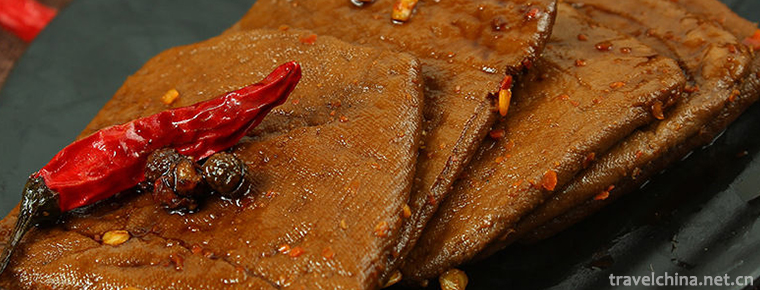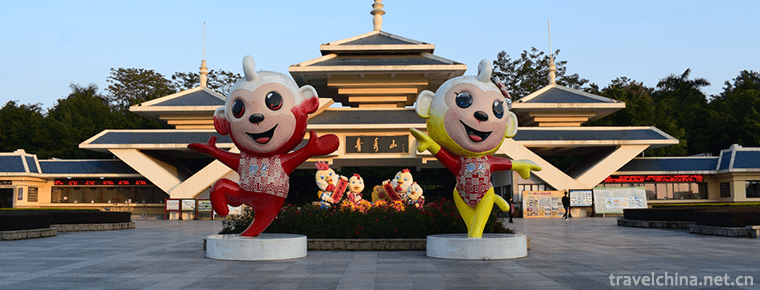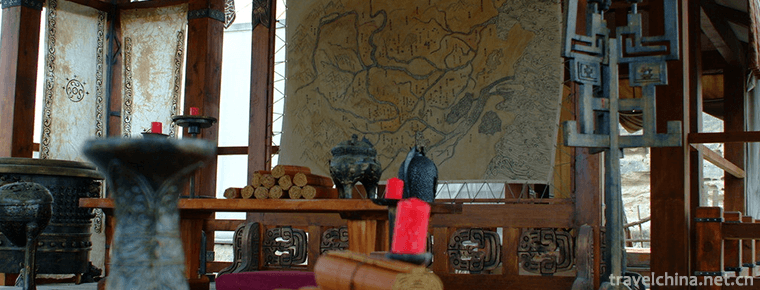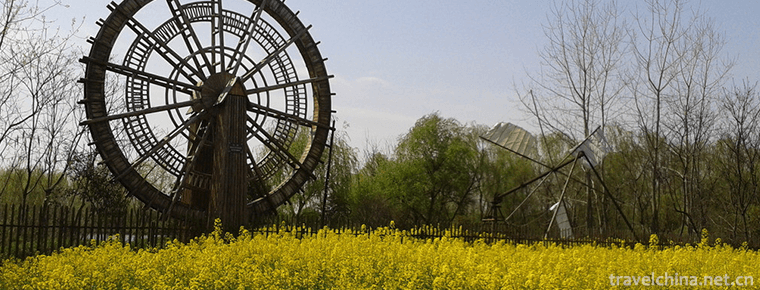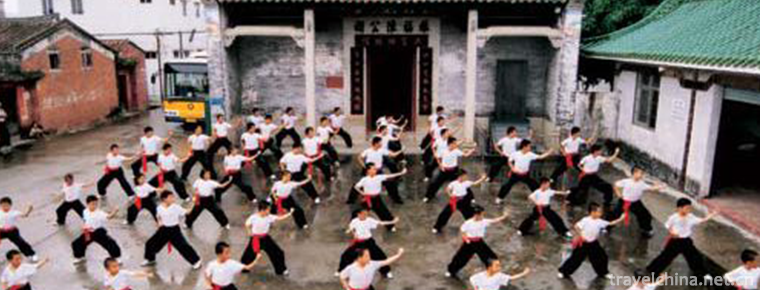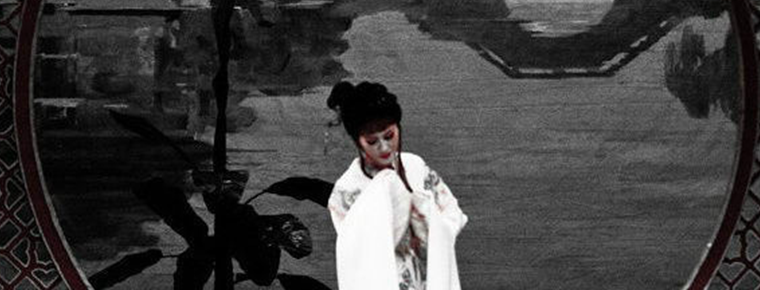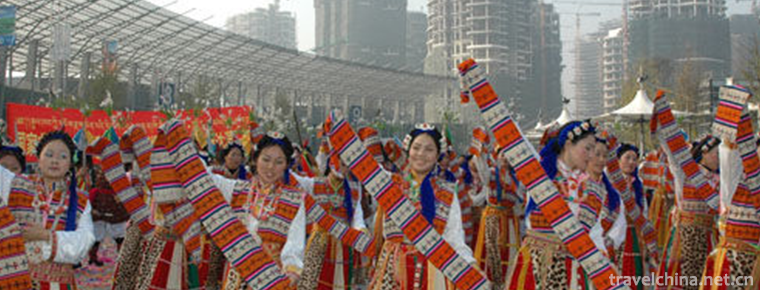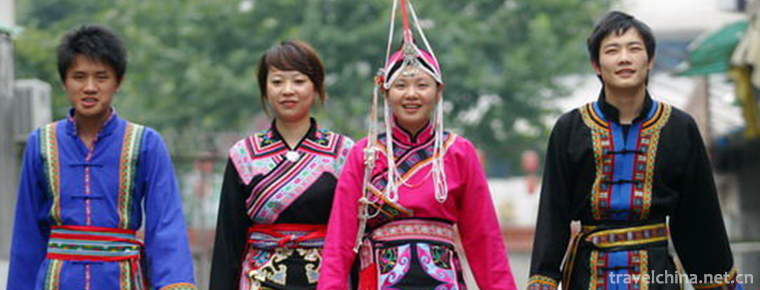Brow tune
Brow tune
Meihu Opera is a local traditional drama in Shaanxi Province. From the development of the floor stall rap and social fire, the floor stall and social fire performances always focus on singing. Its action expansion and role enrichment are a dramatic way. Therefore, in the years of Jiaqing and Daoguang, Meihu tunes moved onto the stage. Banhu, flute and some simple bronze instruments were added to the musical instruments. Most of the music cards used were Ming and Qing ditties and tunes. In the process of forming Meihu Opera, its form is flexible. The melody not only has the legacy of Beiqu and Tanci, but also promotes the development of civilian literature and art.
On June 7, 2008, "Meihu Quzi" declared by Huxian County of Shaanxi Province was listed in the second batch of national intangible cultural heritage list with the approval of the State Council. Heritage serial number: 782V-89.
historical origin
The earliest traceable to Zhou Dynasty is the "Xijing Diao" of Meihu Opera, which is as mournful as a complaint, because of the people's grief about Zhou Youwang who lost his country in favor of him. (See Huxian Chronicle and Shaanxi Local Meihu Quzi Music); Quzi (the ancestor of Meihu) is "Qingqu", and the early historical evidence of its appellation is Wang Zhuo's "Biji Manzhi" and "Zhuzi Language Volume". The first book reads: "Since the Gai and Sui Dynasties, the so-called tunes have gradually flourished, to the Tang Dynasty slightly prosperous. Nowadays, there are numerous noisy and lustful performances. Ancient songs have changed into ancient Yuefu. Ancient Yuefu has changed into modern songs. The latter book reads: "Ancient Yuefu is the overtone of poetry, and later generations fear losing that overtone, adding solid words one by one, and then growing short sentences, this is the song." It can be seen that ancient songs become ancient Yuefu, ancient Yuefu into poetry, poetry into words, so the generation of songs should be earlier than the flourishing Tang Dynasty. "In Dunhuang Opera Ci, there is a Shenhui and Shang's Five Turns" (see Hexi Development History Research, 288 pages), which shows that "the music score of Ci was pregnant with a large number of Dunhuang Opera Ci between Kai and Tian." (See page 88 of the same book) It also shows that the later "Wugeng" tune came from Hexi music score in Beiqu. According to Feng Hui's tomb in Qianjiazui Village, Didian Township, Binxian County, in April 1992, there were 42 reliefs in Feng Hui's tomb, which was born in the late Tang Dynasty and died in the weekend after the Five Dynasties. The upper and lower layers of Feng Hui's tomb formed a complete figure model. A total of 28 figures depicted the lively scene of the two groups of men and women performing scattered music, involving musical instruments such as bamboo, bamboo, clapple, waist drum, pipa, Tala drum, bamboo flute, lusheng, and percussion. Eleven kinds of musical instruments, such as Fangxiang (upper and lower floors), produce the forms of "Gou Team" and "Exhibition (End)" for conducting music and dance. It can be seen that Sanyue (Sanyue) existed in the late Tang Dynasty and the weekend after the Five Dynasties. The Ming Dynasty writer Chaoyi Hanyuanluo's verse "Su Song" in "Su Song of Du Ro, Hukuo" is known as "Qing Song", commonly known as "Song". Nowadays, stories of "Kang Zhuangyuan (Kanghai) performing zaju" and "Wang Xueshi (Jiusi) singing songs" still circulate around Zhou Zhi, Huxian and Wugong in Shaanxi Province. Wang Jiusi's Quzi family was founded in 1511 (six years of Ming Zhengde). Li Kaixian, a dramatist of Ming Dynasty, once gave field guidance. It can be seen that the formation of a complete quyi should be from 1506 to 1521 (Ming Zhengde).
Inheritance significance
historical value
1. Meihu tunes and works reflect the social and historical reality before Ming and Ming Dynasty. "Ming Dynasty Kanghai, Shaanxi Province, two volumes of Yuefu in Quedong, one volume for Xiaoling, a total of 246 Sanqu, 23 music cards. Volume 2 is a set of 35 Sanqu and 215 Qupai. Huxian Wang Jiusi's Sanqu "Bishan Yuefu" and "Mei Bi Ji" contributed a lot to the collection, collation, creation and research of Shaanxi Sanqu and Beiqu (see Shaanxi Provincial Records of Culture and Art, 360 pages). From their works, we can see the lyrics and songs of the Book of Songs, Qin Feng, Daya and Xiaoya, as well as the relics of miscellaneous songs and lyrics in the Han Yuefu. For example, Wang Jiusi's "Drunk in the East Wind": Sometimes barefoot mountains and waters are exposed, sometimes the Baitou Liuyan Peach Gorge, wearing what folded kerchief, knot what crazy socks to be leisurely without talking about flowers, mentioning the seal for tens of thousands of families, laughing at a poor lucky gentleman. "Heart-warming and ear-warming... Qin people have the saying that "one Qing, two Huang, three masts, but not bowl cavity" is exquisite. "Qing" is opera. He is not only a kind of rhyme, but also a kind of civilian literature, which is most popular in rural areas and more popular among women. (See Preliminary Exploration of the Origin of Eyebrow Households by Wang Shaoyou). In the east, west, north and south of Huxian County, where there are music clubs, people's songs are very convenient to sing. In the streets of summer nights and under the trees of hot days, in the harvest field of autumn, in spring and winter kang, there are their elegant music and charming singing from time to time.
2. The stage performance of Meihu Opera will be closer to the times, life and the masses. It will play a very good role in the construction of new socialist countryside and harmonious society. Stage performance, so that more audiences can see and hear, especially the Meihu Opera developed the merits of the opera, and created many new things on the basis of the original. In 1940, Li Bo, a good singer of eyebrow household, was invited by Ke Zhongping to teach eyebrow household by Yan'an People's Opera Troupe in Fuxian County, northern Shaanxi Province. Ma Jianling used the old form to create a new brow opera Twelve Sickles, which Comrade Zhou Enlai watched personally. Later, there were Brothers and Sisters Pioneering Waste Land and Couples Literacy. In 1952, Huang Junyao published Liang Qiuyan, which publicized the Marriage Law. After the founding of the People's Republic of China, the first opera to go out and communicate was the Pohu opera Twelve Sickles, which was created according to Huxian Quzi. In 1958, he went to Beijing to report and perform, and then to Fujian Front Line and 13 provinces and cities in the north and south of the Yangtze River, which had a great influence. Wu De, a native of Nanguancun in Huxian County, played the role of eldest brother Liang in the play Liang Qiuyan. He was received by Zhou Lai, Liu Shaoqi, Peng Dehuai, Chen Yi, He Long, Peng Zhen, Li Xiannian, Bo Yibo and Xi Zhongxun, Li Jishen, Zhang Zhizhong, Zhang Xiruo, Yang Mingxuan and others. Masters of Peking Opera such as Ma Lianliang and Mei Lanfang had cordial exchanges with Wu De. Later "Food" and "Two Bells" also had a great influence. Nan Huairong, who plays Tian Shengde and Liang Mingyi as the main actors in the play, was well received by the audience. After the crushing of the Gang of Four, "Love and Hatred", "Xinghua Village", "Drunken Xinghua Village", "Today's Young People in the Village", "Beautiful Daughter-in-law", and the Meihu opera art films "Liujin County Mayor", "Butcher Zhuangyuan" and "Xinghua Village" all played a very good propaganda and education work to promote socialist modernization in line with the central work of the Party and the government at that time. Use.
artistic value
1. Meihu Opera has flexible forms in its formation process. Its tune has the legacy of Beiqu and Tanci, and it also promotes the development of civilian literature and civilian art. Mr. Wang Shaoyou believes that in the course of its development, it has also absorbed something from other places. For example, "meet and travel" is the name of the original "Yuefu Qing Diao", also known as "Chang'an has a narrow evil behavior", and "Yuefu Solution" said: "The ancient words have the same literary meaning as"chicken song". "Thought song", "Ancient and modern music records" in Wang Seng Confucian poetry cloud: "Rehears the yellow bird sound, the whole work"Acacia song". "Xianghe Song" and "Yuefu Ancient Question to Solve" said: "Yuefu's"Xianghe Song", that is, the eulogy of the streets. When he was young, he was a good tune word, which was distributed around Bian and Luo. "Three continents song" and "Yuefu" are called "song of the Western tune". The song is called "the three continents break the river estuary, the water flows from the gentle River to the river, the joy is joyous, and the total comes to look at it." The School of Beiqu Meihu seems to have deep roots in Tanci. There are speeches and singing in the original variants of Tanci. "Maoxihe Cihua" Yun: "Players of Ci, with stories compiled as rhymes, have white, music, can also play and sing. Once upon a time, most of them were blind. Every evening at dusk, they embraced three strings, played around the street and recruited students easily. Playing and singing are mostly organized in seven-character rhymes, with three, three, four or three-seven syntax. There is no drama as a word must be closely matched with a set of tunes, let alone the flexibility of long and short sentences. Tanci often adds a "foil" to the words and sentences, in order to improve the tone of the auxiliary sentences. (See Wang Shaoxian's Preliminary Exploration of the Origin of Eyebrow Households). Take Wang Jiusi's "Intoxicated East Wind" as an example, and take "Intoxicated East Wind" as an example, "to laugh at a poor lucky gentleman. "One" is a causative sentence, while "shake" is a degree complement of "laugh", "death", which can be interpreted as "very" accurately. (See Explanation of the Words of Poetry and Songs, Reprinted by Zhonghua Publishing House in 1977), Kang Wang who created Sanqu was better than Sun Liang Opera Selection, Wang He Qing Opera Selection, Guan Hanqing Opera Selection, Wei Zhengqu Selection, Ma Yanliang Opera Selection, Boyan Opera Selection, Zhang Hongfan Opera Selection, Solo Royal History Opera Selection, Lu Zhiqu Selection, Gao Wenxiu Opera Selection, Ma Yanliang Opera Selection Selection of Zhiyuan Opera, Selection of Wu Changling Opera, Selection of Buhu Muqu Opera, Selection of Pearl Curtain Opera, Selection of Wang Bocheng Opera, Selection of Zhao Mingdao Opera, Selection of Shizizhang Opera, Selection of Wu Renqing Opera, Selection of Zhenshi Opera, Selection of Sadu Opera, Selection of Ma Qianzhai Opera, Selection of Wang Zhongyuan Opera, Selection of Ali Xiying Opera, Selection of Aruwei Opera Selection, Selection of Gao Keli Opera, Selection of Songs by Sun Zhouqing (Sun is an ancient poet) and other 26 works, "Their feelings of reality are more real,..." A voice of indignation bursts out in the works. Such as Kanghai's Parasitic Grass: A Sense of Reading History: "Heaven should be drunk, the earth is lost!" It is hard for loyal ministers and filial sons to survive in the days when the wind is thunderous and the world is full of flattery and flattery in prosperity. Zhu has not cut off the head of the people, you Hengxiu make heroic spirit. (See History of Chinese Literature (4). Editor-in-chief of Huai Fei Zhenggang, Xiao Difei Town, Enwang, You Guo, shows that Meihu Opera Ci has a strong spirit of realistic criticism and extensive popularity everywhere in its works. Pu Songling in the early Qing Dynasty "Strange Tales from a Liaozhai Studio" Volume 1 "Lucky Cloud Music" in the first "play children" word "new music once a year, silver Niu Silk all left behind, and then rise to play jujube poles, sell Southern branches and insert Luojiang resentment, play children unusually fresh". This Qing Opera Meihu Opera was excluded by the large-scale operas of bang bullets in Jiaqing and Daoguang years, and can only be in exile. During the reign of Xianfeng and Tongzhi, it revived in Huayang, Huazhou, Lintong, Weinan, Pucheng and Fuping. Generally speaking, the Qin Opera is so popular that it dares not confront each other (see Wang Shaoyou's Preliminary Exploration of the Origin of Eyebrow Households).
2. Musical features of tunes and Meihu are humorous and vivid, with a strong earthy flavor. Experts comment on their narrative lyricism, turning to compromise, giving full play to nature, beautiful and magnificent, which promotes the study of Sanqu creation.
(1) The tune is a divertimento sung in a united form to the end. The so-called divertimento has its own rules, such as the beginning of the tune is "overshoot", then the end will end with "overshoot". If the starting tone is back palace, the ending tone must also be back tail; if the starting tone is back palace, the first tone is in front, and the second tone is in front, then at the end, the last tone is "back tail" in front and the last one is "back tail". It is necessary to use a number of individual tunes organically and continuously, and to connect the joy, anger, sadness and music of the lyrics with the various emotional melodies of the tune into a couplet (or suite) or tune skillfully. This kind of Meihu sitting song still retains the shadow of the divertimento in the ancient Zaju in the form and melody of singing. "Yuan Yanzhi'an said in his"On Singing"that"Yuefu is called Yuefu as an article, and there is a set of names at the end of the article. Xiaoling of the time changes leaves". "Here, the so-called Xiaoling refers to a single piece of music; and the so-called set number refers to a set of single pieces of music connected according to certain logic, with introduction before and ending after, that is to say, the so-called suite later; the so-called Yuefu is composed of several sets, with beginning and end, describing a complete story. Meihu tune still maintains the characteristics of the past divertimento to this day, and up to now sitting tune has been singing to the end, with few interlocutions, singing to the end, which further illustrates that the tune has maintained the legacy of the ancient divertimento.
(2) Another feature of the sitting music also shows that this ancient and rigorous form still retains the characteristics of one lead singer and many chorus, which is actually a form of cacophony. It sounds like another style. For example, at the beginning, the first three words of the "back palace" tune were almost opened at the same time by the sitting artists. Another example is: Dalian Chamber, Gang Diao, Picking Flowers and so on, all have the form of accompanying singing. Of course, in the song singing, people only sing in the voice of function words to set off the atmosphere. And the emergence of this style can only be seen in the ancient sitting music. As Mr. Zhu Jingxiu mentioned, the music of "filling in words by leaning on sound" is a kind of progress compared with the popular culture of poetry. There are some contradictions in the combination of tunes when singing the quaternary, quintessential or quintessential sentences in ancient Yuefu or Tang poems. Therefore, "must be mixed with scattered voice, then can double orchestra", "ancient Yuefu poetry, four tones, five tones, there are certain sentences, difficult to enter the song, the middle must add harmony, then can sing", "harmony", "overtone", "scattered voice", must be mixed with "congratulations", "He He He He He He He" and other empty words, can enter the song. He also said: "Therefore, there is no disadvantage of separating the meaning of words, and in terms of rhythm, pause in sentences, tone depression, emotional fluctuations, etc., can be perfectly integrated with the tune, so that the singer's mouth, the listener can easily understand, so that the art of music can be further developed and more widely spread." Huxian Opera still has the form of "chorus" in ancient times, which shows that it has a long history and is different from other tunes. It still retains the ancient form of stall and the characteristics of one lead singer and many others. In addition, it should be pointed out that the emergence and development of any artistic form is inevitably influenced by its dialect and pronunciation. Huxian Opera, from its own special artistic style, can not be replaced by other forms. It has a passionate and generous emotional element or lingering connotation, or joyful and lively, or as if crying, fascinating and fascinating, which makes people enter a state of infatuation. The story is shallow and profound, which makes people awake and has profound educational significance. Many of the songs have their own artistic value, especially those reflecting the lives of the working people. They are vivid, funny and funny. They can really be regarded as singing farm songs. They talk about farm affairs and listen to them very kindly, which can not be said to be a feature.
(3) In the music collected from Huxian County, percussion music is generally not used, and plucked strings are the main instruments, of which three strings are the main backbone and lead instruments, while other Banhu, Erhu and flute are supplementary instruments with Bell touching and four-page tiles. The modes of Huxian tunes are all five backbone tones from "5, 7, 1, 2, 4". Six tones and seven tones are characteristic modes, of which the "slight drop" 7"is the most prominent. That is to say, "non-ascending 4, non-in-situ, non-descending 7, Non-in-situ 7", when playing with finger strength control. This pair of "4" and "7" musical language processing method is unique to local operas.
(See Cao Xibin's Meihu Music in Shaanxi Province.
As the music is bright and melodious, it has achieved a very attractive musical effect, which greatly stimulates the creativity of singers and composers. Farmers are free to compile words according to music, not necessarily literate, as long as they can compile and sing, they can express their thoughts and feelings more freely, and are not subject to emotional constraints. Farmers in real life, compiled things in line with their own reality, coupled with vivid language, clear image, more reasonable. Singing has a more local flavor. Although the aria is regular, it can be changed and transferred according to the character or events, and is not strictly restricted by rigid and rigid eyes. (See "Meihu Music" Appendix Li Jingci's article "Talking about the Northwest"Meihu"(Meihu) Opera", P. 298) Cui Nianxi, an old artist, was a coach of Meihu Opera Research Institute of Shaanxi Province. While teaching the singing tune "Save the Eleven Langs" to the students, with his profound understanding of life and rich artistic experience, he realized the sharp contradiction between content and form if not reformed. It is very difficult to show the mood of the tiger and his bold, rough and courageous character. What should we do? One is to stick to the rules and stick to the incomplete. How does the teacher teach him? He also teaches the students the same way. The other is to break through the tradition and innovate the tune boldly according to the needs of content and character. Comrade Cui Nianxi did not adopt the first attitude, nor did he use the simple method of changing music cards, but went ahead with difficulties. Starting from the content, on the basis of the original music cards, he adopted the artistic technique of alternating flower and crying sounds, and absorbed some tones of Qin Opera music. He reformed the original music in a large amount and created a new brow-household tune, Huabeigong.
Compared with the original tune, Huabeigong has the following characteristics: first, it changes the basic mood of the original tune, better expresses the content and character of the singing; secondly, it absorbs new phonemes on the tone and integrates them with the original tune, making people sound familiar and fresh; thirdly, it changes the bitter tone into floral tone, changing the style and color of the original tune; fourthly, it has new style structure and rhythm. Creation, changed the original long, protracted shortcomings, make the whole song more exciting, more compact, more ups and downs. (See Huxian Literature and History Materials, Volume 7)
3. The lyrics are profound and easy to express people's healthy and simple life, habits, thoughts, feelings, personality, psychology and feelings. This value of folk literature, whether in the form of popular versions of folk copies or oral copies handed down orally. It fully embodies the characteristics of folk literature, which is vivid, easy to remember and easy to sing. Its content even contains contents that are hard to be fully reflected by the official history and barnyard barnyard barnyard history. Especially the folk spoken words with local characteristics are reflected to a certain extent here, which is very valuable, such as "Three Lazy Men Dig Gold": "My name is Liu Guoquan in Household County, I have never done business or been an official... Let's go to three sections of the South Watershed and bury three thousand pieces of silver. Your brothers go to dig it. Don't pass it on to anyone. It's famous and famous, and it's still circulating today. For example, "Great Blessing" and "Pantao Banquet", "My family lives in Huxian County, Shaanxi Province, Qubao Village (in Yuchan Township, Huxian County, there is the legend of"Liu Hai Sa Jin Line"there is a home. Opening your eyes is not in Qianqiu Palace, but a God in the world. I'm here in Jiqingtang to spread money in Fudi. It's very romantic. For example, "couples watch lanterns": "Running bamboo horse lanterns in the street, Liu Hai scattering money cicada lanterns, watermelon lanterns are green, pear lanterns are crisp and lively." For example, "Zhang Lian sells cloth": "What do you do to sell our poplar for money? I don't think it looks good enough to attract crows." Really interesting, humorous. During the census, an earlier "Widow's Field Testing" was found in the teacher Wang Junjie of Xishahe River in Qinzhen: "In May, my widow was kind and sour, and when it rained heavily, she saw people putting Qiu Miao'an (four sounds, seed meaning). Seeing someone else's autumn seedlings come out of the ground, my widow has no Anqiu Tian. "It is really a combination of anxiety and sadness, words and blood, voices and tears, which makes people sad. "Huxian Literature and Art" published in 1984 by Jiang Dehua and Cao Xibin: "Call Yang Guozhong to listen carefully and understand," Four Books"and"Five Classics"you may not read, you rely on your sister's charming beauty, think about what I said is wrong, from now on do not succeed your tiger prestige... Gao Lishi Yang Guozhong, you two are talented and mediocre, how to worship the emperor in the dynasty, you might as well go home and hold a child. "It's really delightful, there is a wind of nine thoughts.
The value of traditional folk literature is also reflected in the nutritional absorption of Huxian folk songs, pastoral songs, woodcut songs, love songs and nursery songs. "King Wen visits virtuous people" to sing, "Sibo Hou busily calls the woodcutter, you sing folk songs who pass on... This place is called Weishuifang. There is an old man holding a fishing rod. The name of the road bears is Jiang Shang. Its tone, sentence pattern and mood are the reproduction of folk songs and woodcutter songs. "Five Points Red" series, "Pastoral Songs of Dragon Girls", "Twenty-eight Hours in Kunyang", "Jiujiu Tu", "Song of Pulling a Boat", "Drought Boat", "Ten Embroidery Songs of Waterlogging Valley" and "Goodman Going to the Countryside" are all typical household and County folk songs. "Dreaming of Second Sister Wa" and "Disease of Second Sister Wa" are purely love songs; Kite Flying, "pole poking in bird's nest in hand, I can't get a genie"; Playing Cherry "Rose Flower Sister, Osmanthus fragrans Erlang, Morning Glory Hat Flower Flower Flower Bed, don't depict flower palms and silver lanterns, Hydrangea Flower Bed" are pure girls'stories, as beautiful as songs.
Pragmatic value
Meihu Quzi is a very practical form in rural areas. Because of its simple instrument, small staff, and no need to build a stage, the owner's expenditure is small, some just manage a meal, which is very popular. Red and white wedding can be used, harvest field can be used, farming season can be used, Naliang Square, old bowl meeting, winter hot Kang can be used at will.
In addition, the content and tune of Meihu's songs are also deeply loved by rural men and women, including folk songs, love songs, pastoral songs, children's songs and song-cuttings, which give people a relaxed and pleasant sense of music. The music of eyebrow household seems to be able to dock freely. The artists'ability and skill of natural docking are amazing. The content of the lyrics is easy to remember and recite. The grandson of Lu Maoyi, an old artist in Luwuqiao Village, in front of his mother's soul, competed to compile and perform a Meikou aria about her mother's pregnancy in October. The melancholy beauty of her music and the truth, goodness and beauty of her ideological content left a deep impression on people. Nowadays, in building a new socialist countryside, the artistic advantages of Meihu Opera, which is close to the masses, life and reality, can be fully brought into play, and the performance market in the countryside is even broader. If we can compile some popular and understandable brow house singing programs according to the spiritual and cultural needs of farmers, we should be welcomed by the masses.
Academic value
The folk song style, lyricism and natural affinity and fusion of Meihu music to traditional folk songs enable some scattered traditional folk minors to be absorbed and sorted out in time, which greatly enriches the traditional folk music in China. From the pastoral song "Little Cattle" to the collected "Flower Collection Tune", from the lively "Fengyang Tune", "Face-to-face Tune" to the powerful "A string of bells", all are the most vivid and active elements of folk music. Further excavation, collection and collation of these sporadic folk music is undoubtedly a great enrichment of the treasure house of Chinese music.
According to the textual research in the history of music, Meihu Opera originated from the Northern Opera of Yuan Dynasty. It is a new musical form formed by the scholars of Ming Dynasty learning from the characteristics of the Northern Opera. About the evolution of Meihu Opera and its combination with folk music, some people say that "Lu Guang entered the Western Regions, took his music in Guizi, took it to the Hexi Corridor, and later spread to the Central Plains, and became popular in the Northern Dynasty, Sui and Tang Dynasties". (See the History of Xihe Development, page 131). How did it spread? Through what channel is it circulated? This is of great academic value.
What is more worth mentioning is that with the efforts of folk artists, Meihu Opera finally competes for beauty in the countryside. "The donkey was planted, the saddle was mixed, you were stirred face to face, and the doll was rolled with mud eggs." Zhang Lian sells cloth like these lively, witty, vernacular language, some professional writers in the house is never written out, and so on, countless.
Folk literature works mostly reflect the suffering of life as the theme, so the sentiment is melancholy, tear-provoking, there are many pleasant things are also unique. Many of us despise folk songs and oral folk literature. This is not only a question of understanding folk literature, but also of familiarity with rural life. The key is that they do not understand folk literature. If we sort out all the lyrics of Meihu songs, it will not be a very valuable folk literature textbook. If we further analyze it and absorb its nutrition, it will be a very important reference for contemporary Chinese literature, especially for rural literary creation. Our rural poetry creation, rural drama creation and the creation of mass singing materials suitable for the needs of the times can all draw valuable nutrition from them.
Inheritance status
Although Meihu Quzi has done a lot of excavation, rescue, inheritance and promotion work with the strong support of the county Party committee and the county government, and the activities have been carried out well, there are still many problems that are difficult to solve:
1. The social basis on which Meihu Opera relies for its survival and development has changed. Some traditional art forms are gradually disappearing. With the development of TV, network and other cultural diversity, the attraction of Meihu tunes has been greatly weakened, and the audience who like Meihu tunes is becoming less and less. Especially with the new event of red and white wedding, the performance market of Meihu Opera Group is getting smaller and smaller, and it can only appear in the form of self-entertainment and self-entertainment.
2. Some accomplished artists will gradually withdraw from the stage because of their old age. Many of them have died one after another, and some of them are difficult to inherit. Especially the Meihu tunes generally do not accept apprentices, and the phenomenon of lack of successors is more serious. The vast majority of young people are either keen on new things or go out to work for a living. As a result, fewer and fewer people are studying Meihu, almost in the fault of the dynasty.
3. Due to lack of financial support, the Meihu Music Society has been unable to replace and add musical instruments and clothes for a long time, and has no money to hire provincial and municipal experts to teach new things, resulting in the lack of innovative performance of Meihu, and the endangered situation is difficult to change.

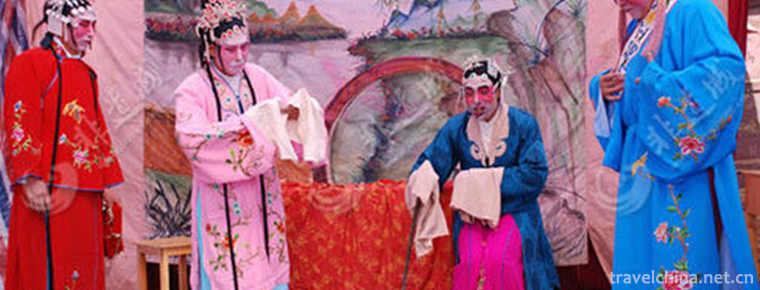
-
Five city tea driedWucheng Dried Tea
Wucheng Dried Tea, a specialty of Xiuning County, Anhui Province, is a national geographical indication product..
Views: 127 Time 2018-11-27 -
Taining Scenic Tourist Area
Taining Scenic Spot: World Geopark, National AAAAA Class Tourist Spot, National Key Scenic Spot, National Forest Park, National Geopark, National Key Cultural Relics Protection Unit.
Views: 182 Time 2018-12-08 -
Qingxiushan scenic spot
Qingxiushan Scenic Area is a national AAAAA scenic spot in Nanning. Qingxiu Mountain is a key scenic spot in Nanning. In addition to protecting and restoring the original historic sites such as Dong Q.
Views: 150 Time 2018-12-12 -
Niulang and Zhinu Scenic Spot
Niulang Zhinu Scenic Area is located in Yanya Town, southeast of Yiyuan County, Shandong Province, 15 kilometers away from the county town. The scenic area is mainly composed of Daxianshan Mountain.
Views: 387 Time 2019-02-07 -
Qinhu National Wetland Park
Qinhu National Wetland Park is located between the central part of Jiangsu Province and the Yangtze and Huaihe River. The total area of the scenic spot is 26 square kilometers..
Views: 146 Time 2019-02-07 -
Cai Lifo quan
Cai Li Foquan is one of the Nanquan in Chinese traditional boxing. Legend has it that Chen Heng (1806-1875), a native of Jingmei Township, the new capital of Guangdong Province,.
Views: 178 Time 2019-04-04 -
Jiangnan Shaoxing opera
Yueju Opera, the second largest opera in China, is also known as "the most widely circulated local opera" . Some people think that it is "the largest local opera",.
Views: 147 Time 2019-05-05 -
Castawin Dance
Castawin Dance, a traditional dance in Heishui County, Sichuan Province, is one of the national intangible cultural heritage..
Views: 191 Time 2019-05-08 -
She Nationality Medicine
She medicine is mainly distributed in Jingning She Autonomous County of Zhejiang Province and in some mountainous areas of Fujian and Jiangxi provinces. She nationality has no written language and is .
Views: 128 Time 2019-06-14 -
Peking Union Medical College
The Chinese Academy of Medical Sciences was established in 1956. Peking Union Medical College was founded in 1917. Since 1957, the Chinese Academy of Medical Sciences and Peking Union Medical College .
Views: 231 Time 2019-09-06 -
Liushi Manorial Museum
Dayi Liushi manoral museum is located at No.15, Jingui street, Anren Town, Dayi County, Chengdu City, Sichuan Province. It is one of the important historical sites and representative buildings in modern China..
Views: 186 Time 2020-11-05 -
Leshans first industry
In 2019, the sown area of crops in Leshan City is 344100 hectares, an increase of 3318 hectares over the previous year. Grain planting area was 217800 hectares, an increase of 122 hectares over the previous year; oil planting area was 46500 hectares.
Views: 319 Time 2020-12-17
